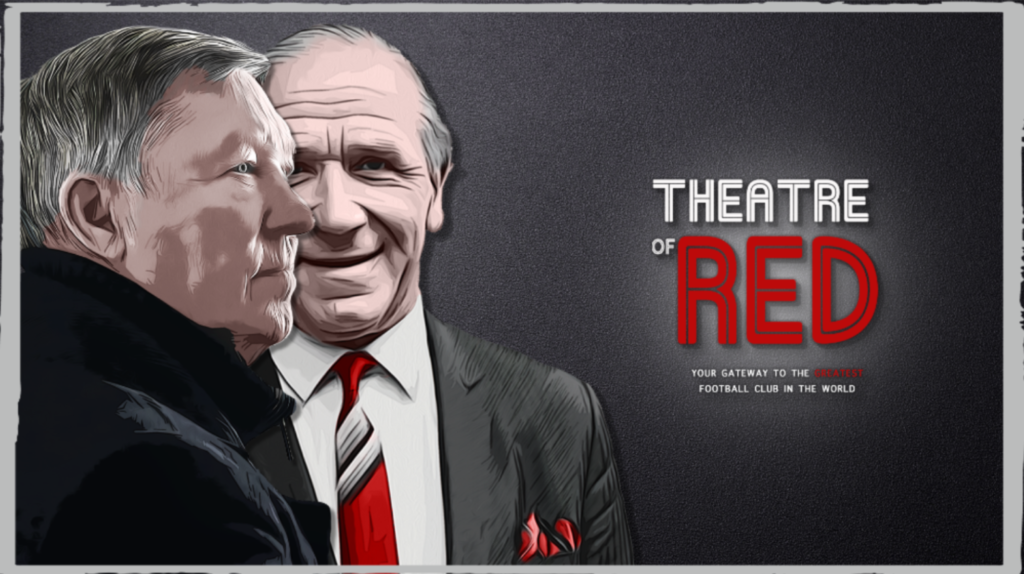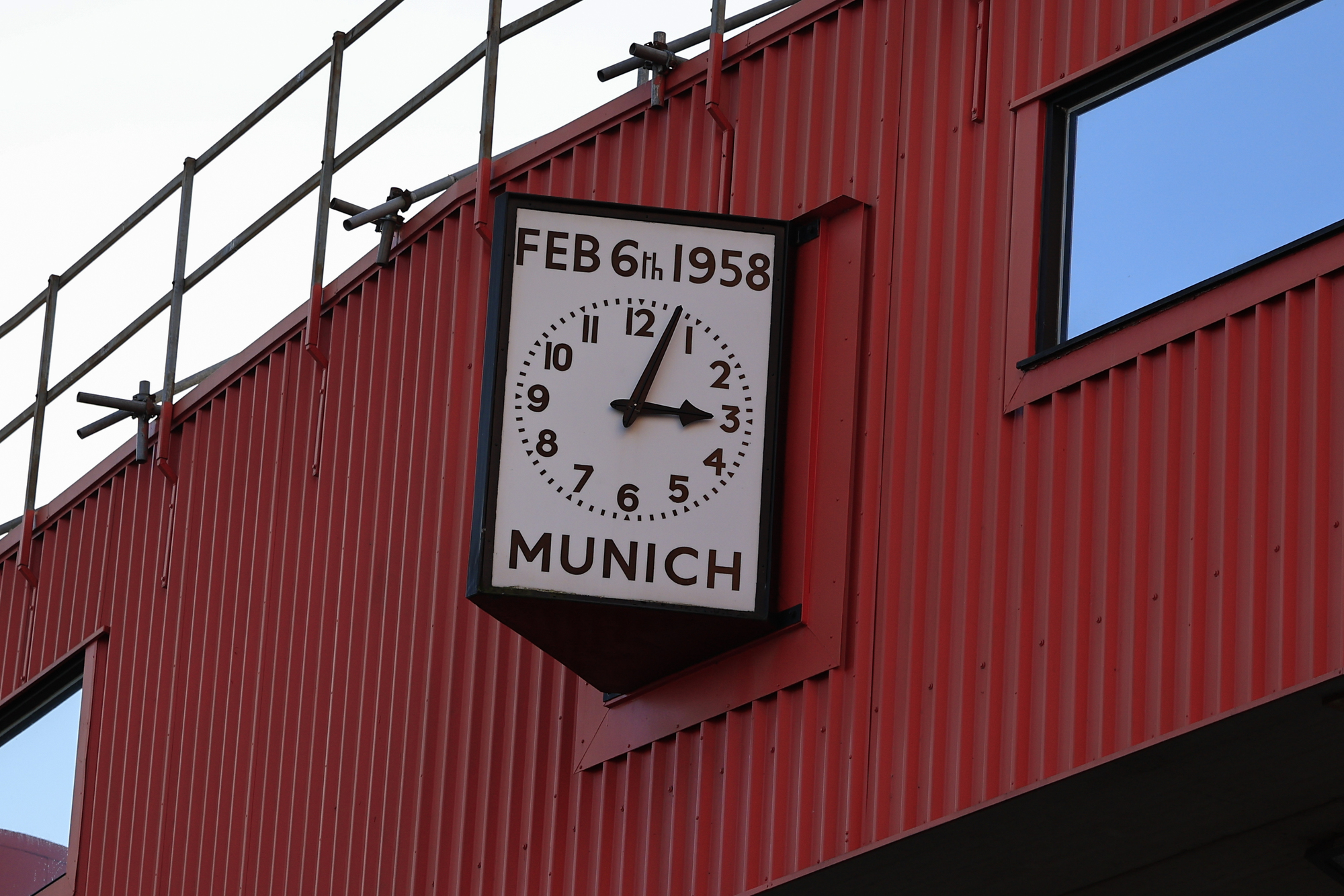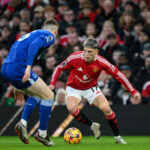In the aftermath of World War II, Manchester United sought to rebuild and return to the forefront of English football.
Under the innovative management of Sir Matt Busby, the club emphasised nurturing young talent.
The Scotsman, alongside his assistant Jimmy Murphy, laid the groundwork for what would become one of the most celebrated and tragic teams in football history.
The term “Busby Babes” refers to the young, talented squad assembled in the early 1950s under the guise of Sir Matt.
His philosophy was to scout and develop players from a young age, promoting them through the club’s ranks to the first team. This approach quickly bore fruit, as the Babes became known for their dynamic, attacking style of play and remarkable team cohesion.
The youthful squad captured the Football League title in 1955-56 and 1956-57 – dominating their opponents with a blend of skill and youthful exuberance.
Further accolades were added in 57′ by winning the Charity Shield and making a significant impression in European competitions, reaching the semi-finals of the European Cup (losing 5-3 to Real Madrid on aggregate).
The group captivated the hearts of fans, embodying a promising future for Manchester United.
The Munich Air Disaster
On February 6, 1958, tragedy struck.
After a European Cup match against Red Star Belgrade, the team’s plane crashed during take-off from a refuelling stop in Munich, Germany.
The British European Airways Flight 609 had attempted take-off twice – both aborted due to boost surging in the left engine.
On the third attempt, the aircraft hit slush at the end of the runway, failed to gain height, and crashed, bursting into flames.
Captain James Thain and co-pilot Kenneth Rayment attempted everything in their power, but the conditions were impossible.
The catastrophe claimed 23 lives, including eight players, three staff members, and several journalists and supporters.
The world was in disbelief, and undeniable incredulity consumed Britain.
The Fallen Babes
Geoff Bent | A reliable full-back, Bent often played as a backup to Roger Byrne. At 25, his potential was unfulfilled.
Roger Byrne | The captain and left-back of the team, Byrne was a tactical genius and an inspirational leader at just 28 years old.
Eddie Colman | At 21, Colman was a spirited midfielder known for his agility and skill, earning the nickname “Snakehips.”
Duncan Edwards | Perhaps the most talented of the Babes, Edwards was only 21 but had already become a dominant force in midfield. His death was a significant loss for English football.
Mark Jones | A 24-year-old central defender, Jones was a strong and commanding presence in the backline.
David Pegg | The 22-year-old winger was renowned for his speed and crossing ability.
Tommy Taylor | A prolific striker, Taylor had scored 112 goals in 166 appearances for United. At 26, he was at the peak of his career.
Liam Whelan | A 22-year-old inside forward from Ireland, Whelan was known for his creativity and scoring prowess.
The Survivors
While the Munich disaster took many lives, several players survived, some going on to contribute significantly to the club’s future successes.
Bobby Charlton | Only 20 at the time of the crash, Charlton would go on to become one of the greatest players in football history. He played a pivotal role in Manchester United’s triumphs on the pitch in the 1960s and was instrumental in the club achieving the levels of notoriety it has today.
Harry Gregg | The goalkeeper who survived the crash and became a hero in rescuing other passengers. Gregg continued his career with distinction and has a legendary status with the fanbase.
Bill Foulkes | A defender who showed remarkable resilience, Foulkes played a crucial role in United’s rebuilding process and their subsequent successes.
Johnny Berry | A talented winger whose career was tragically cut short by the crash. Berry never played professional football again due to the injuries he sustained.
Jackie Blanchflower | Known for his versatility on the field, Blanchflower also never returned to professional football due to his severe injuries from the disaster.
The Aftermath: Remembrance and Rebuilding
In the immediate aftermath of the disaster, Murphy took the reins while Matt Busby recovered from his injuries.
Under the Welsh man’s leadership, the team demonstrated remarkable resilience – reaching the 1958 FA Cup final.
Although defeated 2-0 by Bolton Wanderers, their run to the final was a testament to their indomitable spirit.
The reaction of the British public was one of profound shock, grief, and solidarity. A story that resonated nationwide, transcending club loyalties and uniting the country in mourning.
Newspapers and radio broadcasts were filled with heartbreaking stories and updates about the crash. The sense of loss was palpable, with fans and non-fans alike expressing their sorrow.
Public memorials and tributes sprang up spontaneously, with crowds gathering outside Old Trafford to leave flowers, scarves, and personal messages of condolence.
Churches held special services to pray for the victims and their families. The national outpouring of grief was evident as tens of thousands of people attended the funerals of the players and staff, with many more watching the solemn processions on television.
Clubs across the footballing world sent their condolences, and many offered players on loan to help United rebuild. Real Madrid even offered to withdraw from the European Cup to allow the North West side to stay in the competition.
The tragedy evoked a wave of compassion and support that extended beyond football. The British public rallied around Manchester United, and the period of mourning was marked by a collective determination to honour the fallen by supporting the club’s recovery and future endeavours.
The club’s perseverance culminated in a historic achievement on May 29, 1968. A decade after the Munich disaster, the Busby’s boys won the European Cup, defeating Benfica 4-1 at Wembley Stadium.
This victory was a testament to the resilience and determination of the club. Key players from the surviving Babes, including Charlton and Foulkes, were instrumental in this triumph.
Legacy
Most reading this article – myself included – were not alive to experience the saddest day in the club’s history.
Sir Alex Ferguson recounted the day of February 6, 1958, in his press conference ahead of the 55th anniversary in 2013. These words remain with me to this day.
“I’ve been affected since a young boy. It was a sad time. For many, it’s probably long forgotten, but for someone like me who remembers the day, you won’t forget it.”
The legacy of the Busby Babes is profound.
They represent both the zenith of youthful promise and the depths of unimaginable tragedy. The courage and tenacity shown by the survivors and the club’s revival is a story of inspiration and determination.
Manchester United’s European Cup victory in 1968 is a poignant tribute to those lost in Munich, ensuring that the memory of the Babes endures in football history.
Join the Theatre of Red community across our social channels.
Recent Posts
- Everton 2-2 Manchester United | Five Talking Points
- Spirited fightback returns a Goodison point for Manchester United
- Manchester United gunning for Goodison joy in farewell encounter




